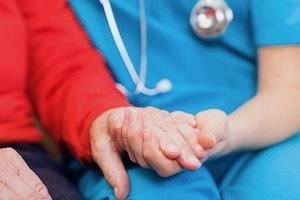In the Community
AU Public Health Students’ Work Continues Unabated Fifty-seven students supporting many areas of need during pandemic

In the midst of the global pandemic crisis, fifty-seven American University public health students are continuing their important mission to support community public health organizations, ranging from the DC Department of Health to the American Heart Association. The students are committed to continuing this work — remotely for now — until their projects are complete.
“It really is incredible that, in the midst of a massive public health crisis, these students are demonstrating their resiliency and ingenuity in executing these important projects for their community partner organizations,” says Jolynn Gardner, director of American University’s Public Health Program. “It is comforting to know that soon they will graduate and enter the public health workforce.”
Real Life, Real Public Health
It’s all part of American University’s public health capstone course, which is offered for senior public health majors. In this course, the students work in small teams to execute semester-long projects for community partner organizations.
Representatives from each organization visit the class early in the semester to pitch projects to the students. After the students rank their top three project preferences, the professor assigns the project and teams, and the real work begins. “Essentially, the students work as consultants for the organizations, with the mentorship and guidance of the professor and community partner liaisons,” says Gardner.
The projects focus on research, analysis, policy, and outreach. For the DC Department of Health, the AU team is developing a toolkit for resource guide development and putting together a guide for Alzheimer’s disease and dementia services in the District of Columbia. For the DC Volunteer Lawyers Project, another AU team is pulling together recommendations to improve outreach efforts to potential clients who have experienced domestic violence. For Green America, the AU team is developing a research brief on the health effects of toxic chemicals on garment workers, their communities, and the environment.
Samantha Frank: Opening Doors
Samantha Frank (BS public health, minor in health promotion ’20) is currently working with Jubilee Housing, an organization that provides support services to low-income DC populations, from elementary school-aged children to the elderly. They provide affordable homes to families who earn 30 percent or below area median income, offer childcare to working adults, and connect residents to resources and opportunities available to them right in their own neighborhoods.
Frank’s team is working on providing programmatic recommendations for Jubilee's Teen Center that analyze and synthesize a combination of academic and real-world evidence of youth activities in a social services context.
“Our work is important because, as we know, education is the door to opportunity and success, but many students lack the key to open it due to a myriad of barriers,” says Frank. “Jubilee Housing's Teen Center focuses on providing teens with the resources and support to prepare for college or careers, whatever their trajectory may be.”
Forrest Holcombe: Tackling Obesity
Forrest Holcombe (BS public health, pre-med track ’20) is working on a team of public health seniors including Emma Bixler, Michael Abate, Victoria Graziosi, and Allison Halford on a partnership between the American Heart Association, the YMCA, and Children’s National Hospital. The program, called FLiP (Family Lifestyle Program), targets youth who are at at-risk for obesity. It works with their families to help them make incorporate healthy food and physical activity in their lifestyles.
Holcombe’s team is compiling a community resource guide for each of the eight wards in the District of Columbia. They will include local resources like farmer’s markets, healthy corner stores, free meals, cooking classes, food assistance programs, and physical activity locations. Physicians at Children’s National Hospital will use the guides to suggest resources to at-risk youth and their families.
“Obesity is one of the largest public health issues affecting Americans, and it’s the source of so many other issues,” Holcombe says. “Even when we look at COVID-19, so many obesity-related comorbidities like diabetes and heart disease can make someone more susceptible.”
Holcombe has high hopes for the FLiP project. “Kids have very little control over food and their environments,” he says. “By intervening at the family level, I hope we can increase overall health in our society.”
Hannah Fuchs: domestic Violence
Hannah Fuchs (BS public health, BS applied statistics ’20) is working with the DC Coalition Against Domestic Violence, which strives to prevent all forms of domestic violence though increased advocacy and education. The organization frequently testifies to the DC City Council to push for more funding and programming for this critically important issue.
Fuchs’ team is working to assess the knowledge of DC youth on their rights regarding domestic violence by creating a survey, reviewing the legislation across the US that applies to minors’ rights to care, and drafting a social media campaign to help raise awareness.
“A family member of mine was a victim of domestic abuse in their childhood, and I firmly believe that no one should face harm from those that claim to love them,” says Fuchs, explaining why this work is so important to her. “Domestic violence is widespread in our society, and in the #MeToo moment, more people are willing to have conversations about it, so I believe it is the perfect time to work towards solutions.”
Life in a Difficult Period
Fuchs, who is studying statistics in addition to public health, is not worried about the continuation of classes and studies during the pandemic. “All my math classes are recorded lectures, and my professors have online office hours,” she says. “I think it will be okay.”
Frank agrees. “While our capstone team certainly misses meeting face-to-face on a weekly basis, we're making the most of the situation. Fortunately, we have access to FaceTime and Google Hangouts and have been meeting virtually,” she explains. “All we can do is be positive and try to persevere.”